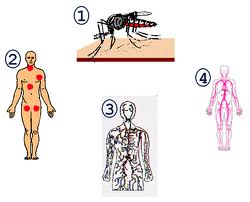 |
| Add caption |
What makes the situation really tricky to deal with is the fact that unlike ordinary mosquitoes, the ones carrying the dengue virus breed on clean water and are active especially at dawn and sunset. Along with the use of insect repellents, doctors are particularly urging the people to ensure that all water tanks or containers in their homes are properly covered to keep the mosquitoes away. One cannot help but worry more about the flood-affected areas, where the population is now a sitting duck for the tricky virus.
There is no doubt that so far as preventives measures like fumigation drives are concerned, the government has to play its part and see to it that places most likely to be the breeding grounds of mosquitoes are heavily sprayed. However, since the functioning of the local governments, especially in big cities, has been literally paralysed on account of suspension of funds by provincial governments, and the former have been in doldrums for the past two years, the fumigation drive that used to become a regular exercise at this time of the year has almost come to a halt. It is also a fact that so long as fumigation had been carried out effectively, the virus had remained under manageable limits. It is a paramount duty of the government to give precedence to the welfare of the people to any other interest.
Treatment
Medical Care
- Dengue fever is usually a self-limited illness, and only supportive care is required. Acetaminophen may be used to treat patients with symptomatic fever. Aspirin, nonsteroidal anti-inflammatory drugs (NSAIDs), and corticosteroids should be avoided.
- Patients with known or suspected dengue fever should have their platelet count and hematocrit measured daily from the third day of illness until 1-2 days after defervescence. Patients with a rising hematocrit level or falling platelet count should have intravascular volume deficits replaced. Patients who improve can continue to be monitored in an outpatient setting. Patients who do not improve should be admitted to the hospital for continued hydration.
- Patients who develop signs of dengue hemorrhagic fever warrant closer observation. Patients who develop signs of dehydration, such as tachycardia, prolonged capillary refill time, cool or mottled skin, diminished pulse amplitude, altered mental status, decreased urine output, rise in hematocrit levels, narrowed pulse pressure, or hypotension, require admission for intravenous fluid administration.
- Successful management of severe dengue requires careful attention to fluid management and proactive treatment of hemorrhage. Intravascular volume deficits should be corrected with isotonic fluids such as Ringers lactate solution. Boluses of 10-20 mL/kg should be given over 20 minutes and may be repeated. If this fails to correct the deficit, the hematocrit value should be determined, and, if it is rising, limited clinical information suggests that a plasma expander may be administered. Starch, dextran 40, or albumin 5% at a dose of 10-20 mL/kg may be used. One recent study has suggested that starch may be preferable because of hypersensitivity reactions to dextran.35 If the patient does not improve after this, blood loss should be considered. Patients with internal or gastrointestinal bleeding may require transfusion. Patients with coagulopathy may require fresh frozen plasma.
- After patients with dehydration are stabilized, they usually require intravenous fluids for no more than 24-48 hours. Intravenous fluids should be stopped when the hematocrit level falls below 40% and adequate intravascular volume is present. At this time, patients reabsorb extravasated fluid and are at risk for volume overload if intravenous fluids are continued. Do not interpret a falling hematocrit value in a clinically improving patient as a sign of internal bleeding.
- Platelet and fresh frozen plasma transfusions may be required to control severe bleeding. A recent case report demonstrated good improvement following intravenous anti-D globulin administration in two patients. The authors proposed that, similarly to nondengue forms of immune thrombocytopenic purpura, intravenous anti-D produces Fcγ receptor blockade to raise platelet counts.36
- Patients who are resuscitated from shock rapidly recover. Patients with dengue hemorrhagic fever or dengue shock syndrome may be discharged from the hospital when they meet the following criteria:
- Afebrile for 24 hours without antipyretics
- Good appetite, clinically improved condition
- Adequate urine output
- Stable hematocrit level
- At least 48 hours since recovery from shock
- Absence of respiratory distress
- Platelet count greater than 50,000 cells/μL
Surgical Care
No specific surgical intervention is necessary in patients with dengue fever, dengue hemorrhagic fever, or dengue shock syndrome.Consultations
- Consultation with an infectious diseases specialist may be helpful in guiding decisions regarding diagnosis and treatment.
- Consultation with a critical care medicine specialist may be helpful when treating patients with dengue hemorrhagic fever or dengue shock syndrome and severe hemorrhagic manifestations or shock.
Diet
- No specific diet is necessary for patients with dengue fever.
- Patients may become dehydrated from fever, lack of oral intake, or vomiting. Patients who are able to tolerate oral fluids should be encouraged to drink oral rehydration solution, fruit juice, or water to prevent dehydration.
- Return of appetite after dengue hemorrhagic fever or dengue shock syndrome is a sign of recovery.
Activity
Bedrest is recommended for patients with symptomatic dengue fever, dengue hemorrhagic fever, or dengue shock syndrome.Medication
No specific antiviral medication currently is available to treat dengue infections. Single-dose methylprednisolone showed no mortality benefit in the treatment of dengue shock syndrome (dengue shock syndrome) in a prospective, randomized, double-blind, placebo-controlled trial.37Acetaminophen (paracetamol) is recommended for treatment of pain and fever. Aspirin, other salicylates, and NSAIDs should be avoided.






No comments:
Post a Comment